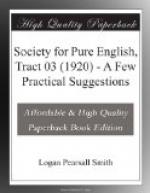have recently been noted. As this is more than
a mere change in orthography, being in fact a part
of the process of de-assimilation, members of our Society
would do well to avoid the use of the archaic forms
in all words which have become thoroughly English,
and which are used without thought of their etymology.
The matter is not so simple with regard to words of
Latin or Greek derivation which are only understood
by most people through their etymology; and for these
it may be well to keep their etymologically transparent
spelling, as aetiology, [oe]strus, &c.
Whether learned words of this kind, and classical
names such as Caesar, AEschylus, &c.,
should be spelt with vowels ligatured or divided (Caesar,
Aeschylus), is a point about which present
usage varies; and that usage does not always represent
the taste of the writers who employ it. Mr. Horace
Hart, in his Rules for Compositors and Readers
at the University Press, Oxford, ruled that the
combinations ae and oe should each be
printed as two letters in Latin and Greek words and
in English words of classical derivation, but this
last injunction is plainly deduced from the practice
of editors of Latin texts, and is an arbitrary rule
in the interest of uniformity: it has the sanction
and influence of the Clarendon Press, but is not universally
accepted. Thus Dr. Henry Bradley writes, ’This
question does not seem to me to be settled by the
mere fact that all recent classical editors reject
the ligatures, just as most of them reject other aids
to pronunciation which the ancients had not, such as
j, v, for consonantal i, u. Many
printers have conformed the spelling of English
words in this respect to the practice of editors of
Latin texts. I confess my own preference is for
adhering to the English tradition of the ligature,
not only in English words, but even in Latin or Greek
names quoted in an English context. If we write
ae, oe in Philae, Adelphoe, we need the diaeresis
in Aglae, Pholoe, and a name like Aeaea looks very
funny in an English context. The editors of Latin
texts are perfectly right in discarding the ligatures;
but so they are also in writing Iuuenalis; Latin is
one thing and English is another.’
[Footnote 1: Shakespeare would have assisted the Hyena in her attempt to naturalize herself in England:
‘I will laugh like a Hyen, and that when thou art inclined to sleep.’ A.Y.L., IV. i. 156. [ED.]]
IV. Dying Words.
Our language is always suffering another kind of impoverishment which is somewhat mysterious in its causes and perhaps impossible to prevent. This is the kind of blight which attacks many of our most ancient, beautiful, and expressive words, rendering them first of all unsuitable for colloquial use, though they may be still used in prose. Next they are driven out of the prose vocabulary into that of poetry, and at last removed




